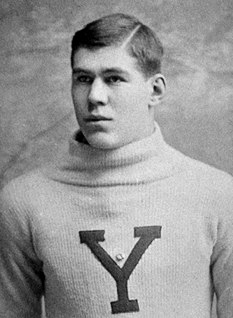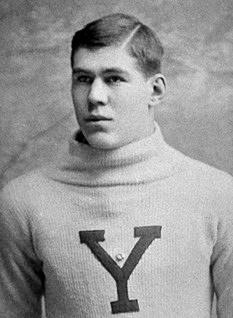Here’s the story of the very first pro football player.

Football was invented at Ivy League colleges in the 1870s, combining rugby with some other ball games popular at the time. For more than 50 years the college game was the dominant form of the sport, both in terms of the number of teams and the number of fans. College football was football. But what about people who didn’t go to college, or grads that wanted to relive their glory days? They wanted to play, too, and they wanted teams they could root for. So in the 1890s local sports clubs and businesses began to organize teams.
These sports clubs, such as the YMCA, had an agenda: their members saw them as stepping-stones to get into even more exclusive clubs and a great way to do that was to belong to a club with a successful sports team. So the pressure was on from the beginning to recruit the best men possible.
One problem: it was against the rules to pay athletes for playing. Amateurism was seen as a noble quality; getting paid to play was seen as crass. So instead of breaking the rules, the clubs bent them. San Francisco’s Olympic Athletic Club, for example, promised to find a job for any athlete that joined the club. Even if this didn’t technically violate the rules, it certainly violated the spirit of amateurism. But the practice was so widespread that, rather than condemn it, in 1890 the Amateur Athletic Union, which governed amateur clubs, created an entirely new category for that kind of athlete—the “semiprofessional.”
Lord of the Ringers
William “Pudge” Heffelfinger was a former All-American for Yale University. One of the best players of his time, Heffelfinger was famous for hurling himself over the heads of interlocked offensive linemen and cannonballing knee-first into the ball carrier’s chest. (Needless to say, the rules of football were quite different back then.)
A popular practice at the time was to cheat by hiring ringers, skilled college players who posed as average Joes and played under assumed names. Heffelfinger was sorely needed by two rival clubs in Pittsburgh, Pennsylvania: the Allegheny Athletic Association and the Pittsburgh Athletic Club. After playing to a 6–6 tie in the citywide championship game in October 1892 (highly contested because Allegheny had stolen some of Pittsburgh’s best players), a rematch was set for three weeks later. Both clubs scrambled to field the best teams possible; both clubs secretly met with Heffelfinger.
Game Day
More than 3,000 people turned out for the rematch on November 12, even though it was snowing. The Allegheny crowd cheered when Pudge took the field with their team. The Pittsburgh side cried foul—Allegheny was using ringers, after all. They refused to play unless Allegheny agreed that all bets placed on the game were off. (Gambling was another big part of the early game.) After nearly an hour, Allegheny agreed.
For all the hoopla that led up to it, the game itself was pretty uneventful. Pudge scored the only touchdown, and Allegheny won 4–0 (back then, a touchdown only counted for four points—today it counts for six). Even with the low score and the bitterly cold weather, the crowd was entertained by the brutal play and carnage on the field. Several players were injured—three had to be carried off on stretchers.
Today, Pudge Heffelfinger is just a footnote in professional football. He wouldn’t even be that, were it not for a single scrap of paper that survived among the Allegheny Athletic Association’s financial records for the 1892 season. Today that scrap of paper— an expense sheet for the November 12 game—is on display in the Pro Football Hall of Fame. On it is an entry showing that, in addition to being reimbursed for his expenses, Heffelfinger received a $500 “game performance bonus for playing.” And in those days, $500 was about what a schoolteacher made in a year. Although neither Pudge nor Allegheny ever admitted to the transaction, the expense sheet speaks for itself: Heffelfinger was the first documented professional football player in the history of the game.









